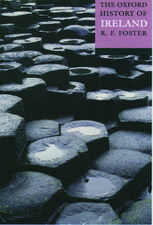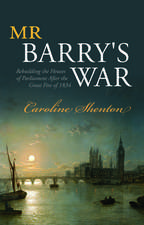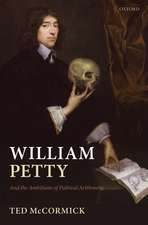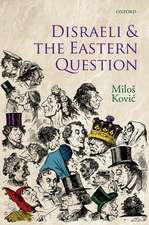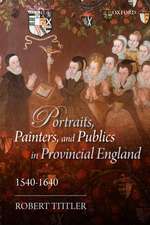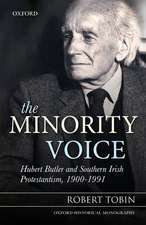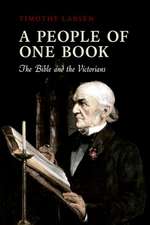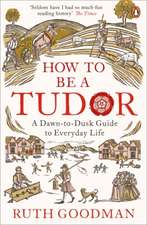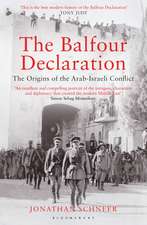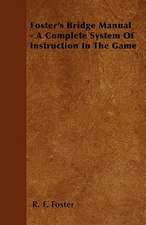W. B. Yeats: A Life Vol.2: II: The Arch-Poet 1915-1939
Autor R. F. Fosteren Limba Engleză Hardback – oct 2003
Preț: 513.57 lei
Preț vechi: 708.35 lei
-27% Nou
Puncte Express: 770
Preț estimativ în valută:
98.27€ • 102.60$ • 81.33£
98.27€ • 102.60$ • 81.33£
Carte tipărită la comandă
Livrare economică 24-31 martie
Preluare comenzi: 021 569.72.76
Specificații
ISBN-13: 9780198184652
ISBN-10: 0198184654
Pagini: 856
Ilustrații: 16pp halftone plates
Dimensiuni: 162 x 241 x 50 mm
Greutate: 1.33 kg
Editura: OUP OXFORD
Colecția OUP Oxford
Locul publicării:Oxford, United Kingdom
ISBN-10: 0198184654
Pagini: 856
Ilustrații: 16pp halftone plates
Dimensiuni: 162 x 241 x 50 mm
Greutate: 1.33 kg
Editura: OUP OXFORD
Colecția OUP Oxford
Locul publicării:Oxford, United Kingdom
Recenzii
Foster, a historian with a great literary sensibility, masterfully tells the story of W.B. Yeats, and the whole landscape of the poet emerges afresh.
... excellent and exhaustive biography.
'Magisterial' and 'monumental' are the words for which one reaches in awed response to this second volume of Roy Foster's biography of Yeats. Yet such routine blurb epithets hardly convey the book's special strengths; suppleness, subtlety, patience might come closer. What is remarkable is the tenacity and skill with which the historian has stuck to his task.
The rich, messy, complicated, heroic and ignoble life of Yeats is all here ... Above all, [Foster] shows throughout how, with Yeats, the life generated the poetry and the poetry animated the life.
Foster has an eye and an ear for poetry to match his special skills as historian and biographer. For all of us who care about Yeats he has done a great service; this is a book we will be revisiting again and again.
This is a hugely absorbing, meticulously researched, stately biography of a great and peculiar man that illuminates, without explaining, the mystery of his creativity. For lovers of his work, it is an essential companion to the poetry.
Roy Foster has quite magnificently done his best to help us reach into and read W. B. Yeats. To recommend this book to others is an honour.
It is hard to know which to admire the more: the unravelling of Yeats's own politics or the historian's understanding of the new Ireland.
The treatment afforded Leda and the Swan can be taken as a touchstone of the book's method and manner. Dilligent, thorough, unobstructed by jargon or modishness, careful with the details of both the life and any poem under consideration, measured and intelligent in its readings and criticism, this is a model approach to literary biography.
... for those who think the poetry of Yeats one of the great inheritances of the century now mercifully finished, the second instalment of the mighty work of University of Oxford historian R. F. Foster is welcome.
Again Foster approaches Yeat's memoirs with skepticism, shrewdly and scrupulously applying the historical facts to Yeats's self-made image and his poetry.
Foster's initial volume is exceptional ... The Arch-Poet is no less outstanding.
My first choice is R.F. Foster's W. B. Yeats: A Life, II: The Arch-Poet, the concluding volume of his magisterial biography of the great poet. Reading it, you don't just understand Yeats better: you understand Ireland better as well.
R.F. Foster's W.B. Yeats: A Life: II: The Arch-Poet, 1915-1939 achieved that rare feat of becoming a classic on publication. One of its greatest illuminations is on the imaginative and deeply necessary role Yeats played in the embryonic years of the Free State.
R.F. Foster's training as an historian and his feeling for literature join together to create both a formidable scholarly work and a marvellous story.
... the second volume of [Foster's] biography of Yeats completes with great elegance the most important Irish biographical project of the era.
The biography of the year - of the decade - is surely R.F. Foster's W. B. Yeats: A Life, II: The Arch-Poet, 1915-1939, a magnificent account of a magnificent life, and a timely redefinition of that difficult concept "Irishness".
... superb on the poetry, the politics and the personal life.
Foster's control of such voluminous material is remarkable in itself, but it is not achieved at the expense of lucidity nor of intelligent reading of the poetry. And through its long course we are constantly enlivened by Foster's ironical wit.
Foster's biography is a magnificent achievement.
I have never read a biography of any poet that has conveyed so clearly the genius of its subject and the talent of its author.
Elegant, interesting, comprehensive, the book marshalls its army of facts lightly, anecdotally, magisterially. It will be plundered by critics and historians, for generations probably.
There are few writers better able to place Yeats in a broader historical, political and, yes, religious context ... a magisterial biography.
... as readable as it is definitive.
Yeats once described his art to Ezra Pound as "an accident in one's search for reality". In this lively new book Foster captures all the richness of that reality, creating a balanced view of Yeats's poetry and his politics alike.
... as much an introduction to the fraught history of Irish nationalism as a definitive life of Ireland's best-loved poet.
The overwhelming impression one carries away from this wonderful book is one of dense activity, constant creativity, endless self-examination and extraordinary achievement, packed into the last 20 years of Yeats's life. That all of this can be clearly laid out, and expertly mediated to us, is a mark of Foster's great scholarship, fine intelligence and detached empathy.
Foster's capacity to intelligently interweave the life and the work gives the narrative resonance and depth, and immeasurably enriches our understanding of these great works.
Foster's takes on the great poems are as good as anything one will find, and better than most because of his detailed understanding of their contexts and the clarity of his prose.
[Foster] places Yeats in a scrupulously balanced context. While he does not hide the poet's reactionary views, he also demonstrates that those were free of the taint of anti-Semitism ... Foster is also an admirable interpreter of the poems.
... this book reminds us how inspiring lives can be in their retelling. It lets us imagine, as Yeats wanted to imagine in 1925, 'history grown symbolic, the biography changed into a myth'.
In writing this biography of Yeats as one biography of Ireland in his times, Foster is writing a new kind of history, as well as a new kind of biography.
... it is the miracle of this book that it is exhaustive without ever being exhausting. The narrative never flags, and the writing never falters; neither the intricacies of the political situation, nor the deft and sometimes daft ingenuities of Yeats's A Vision stop the pace. And the poems are treated with a brief eloquence that makes them instantly more readable.
Rich as Foster's achievement was in the first volume, the second volume is more astonishing yet.
... the biography will be invaluable to scholars, who will mine it for decades to come. Every decent library should have it.
... one of the most scholarly and entertaining biographies of recent years.
Foster is adept in presenting the evidence and leaving it to the reader to judge.
... an extraordinary achievement ... this is the biography that no lover of Yeats's poetry can afford to be without.
... a biography to stand beside Ellmann's James Joyce.
Yeats has found his ideal biographer, a sparkling controversialist with exactly the right degree of patience with the visionary thought, ready to suspend belief where the poet's claimed credulity becomes excessive.
Foster is wonderfully readable; he keeps a courteous rein on his scepticism, but it is given occasional licence to fine comic effect.
... the volume's distinctive and triumphant form places the poems in relief against the historical and personal documentation, rather like set pieces embedded in a film script.
Roy Foster exemplifies the virtues of that Irish intellect so often invoked by Yeats himself, independent, vigorous, liberal and, on occasion, consciously provocative.
The Apprentice Mage gave promise of a masterwork and the promise is fulfilled in The Arch-Poet. What we have now is one of the great biographies, as affectionate as it is scholarly, intellectually equal to the tasks it sets itself.
... this triumphant sequel to The Apprentice Mage, Roy Foster's first volume of biography, which traced the poet's development until his 50th year. The new volume lives up to the expectations created by that greatly lauded book. It is rammed with a life that comes from its subject's Shakespearean capacity to be simultaneously at home in the worlds of high policy and deep imagining and its author's Boswellian attentiveness to his every mental and physical move.
The completion of this biography is in itself a moment of cultural rearticulation in Ireland. The work involved is staggering, but the narrative carries it with the ease of a lifting wave.
... magnificent.
Foster tells the whole story with just that blend of empathy and scepticism which allows him to register the frequent absurdities amidst all the grandeur.
Foster reminds us every so often of what is happening offstage as well as on, giving a sense of depth and perspective to the emerging portrait.
To restore openness to each moment of a long, rich life requires a mastery of many different planes of narrative, all unfolding simultaneously ... Foster's gifts as a narrative historian, as well as his talent for archival research, mean that he is equal to the task. The amount of detail included in some paragraphs is quite astonishing, yet the prose never seems weighed down by this knowledge. The result is not only a major study in itself, but a trove which will be mined by commentators for years to come.
...it is the detailed research, well-serviced by a graceful literary style, which makes this work so valuable and enduring. The dust of the archives never clutters the narrative momentum. This is partly a testament to the propulsion lent the ale by the full, varied, and engaged life that Yeats led, but it is also a tribute to the tight and unobtrusive stitching of the narrative structure. In short, it is a biographical achievement worthy of its subject.
... excellent and exhaustive biography.
'Magisterial' and 'monumental' are the words for which one reaches in awed response to this second volume of Roy Foster's biography of Yeats. Yet such routine blurb epithets hardly convey the book's special strengths; suppleness, subtlety, patience might come closer. What is remarkable is the tenacity and skill with which the historian has stuck to his task.
The rich, messy, complicated, heroic and ignoble life of Yeats is all here ... Above all, [Foster] shows throughout how, with Yeats, the life generated the poetry and the poetry animated the life.
Foster has an eye and an ear for poetry to match his special skills as historian and biographer. For all of us who care about Yeats he has done a great service; this is a book we will be revisiting again and again.
This is a hugely absorbing, meticulously researched, stately biography of a great and peculiar man that illuminates, without explaining, the mystery of his creativity. For lovers of his work, it is an essential companion to the poetry.
Roy Foster has quite magnificently done his best to help us reach into and read W. B. Yeats. To recommend this book to others is an honour.
It is hard to know which to admire the more: the unravelling of Yeats's own politics or the historian's understanding of the new Ireland.
The treatment afforded Leda and the Swan can be taken as a touchstone of the book's method and manner. Dilligent, thorough, unobstructed by jargon or modishness, careful with the details of both the life and any poem under consideration, measured and intelligent in its readings and criticism, this is a model approach to literary biography.
... for those who think the poetry of Yeats one of the great inheritances of the century now mercifully finished, the second instalment of the mighty work of University of Oxford historian R. F. Foster is welcome.
Again Foster approaches Yeat's memoirs with skepticism, shrewdly and scrupulously applying the historical facts to Yeats's self-made image and his poetry.
Foster's initial volume is exceptional ... The Arch-Poet is no less outstanding.
My first choice is R.F. Foster's W. B. Yeats: A Life, II: The Arch-Poet, the concluding volume of his magisterial biography of the great poet. Reading it, you don't just understand Yeats better: you understand Ireland better as well.
R.F. Foster's W.B. Yeats: A Life: II: The Arch-Poet, 1915-1939 achieved that rare feat of becoming a classic on publication. One of its greatest illuminations is on the imaginative and deeply necessary role Yeats played in the embryonic years of the Free State.
R.F. Foster's training as an historian and his feeling for literature join together to create both a formidable scholarly work and a marvellous story.
... the second volume of [Foster's] biography of Yeats completes with great elegance the most important Irish biographical project of the era.
The biography of the year - of the decade - is surely R.F. Foster's W. B. Yeats: A Life, II: The Arch-Poet, 1915-1939, a magnificent account of a magnificent life, and a timely redefinition of that difficult concept "Irishness".
... superb on the poetry, the politics and the personal life.
Foster's control of such voluminous material is remarkable in itself, but it is not achieved at the expense of lucidity nor of intelligent reading of the poetry. And through its long course we are constantly enlivened by Foster's ironical wit.
Foster's biography is a magnificent achievement.
I have never read a biography of any poet that has conveyed so clearly the genius of its subject and the talent of its author.
Elegant, interesting, comprehensive, the book marshalls its army of facts lightly, anecdotally, magisterially. It will be plundered by critics and historians, for generations probably.
There are few writers better able to place Yeats in a broader historical, political and, yes, religious context ... a magisterial biography.
... as readable as it is definitive.
Yeats once described his art to Ezra Pound as "an accident in one's search for reality". In this lively new book Foster captures all the richness of that reality, creating a balanced view of Yeats's poetry and his politics alike.
... as much an introduction to the fraught history of Irish nationalism as a definitive life of Ireland's best-loved poet.
The overwhelming impression one carries away from this wonderful book is one of dense activity, constant creativity, endless self-examination and extraordinary achievement, packed into the last 20 years of Yeats's life. That all of this can be clearly laid out, and expertly mediated to us, is a mark of Foster's great scholarship, fine intelligence and detached empathy.
Foster's capacity to intelligently interweave the life and the work gives the narrative resonance and depth, and immeasurably enriches our understanding of these great works.
Foster's takes on the great poems are as good as anything one will find, and better than most because of his detailed understanding of their contexts and the clarity of his prose.
[Foster] places Yeats in a scrupulously balanced context. While he does not hide the poet's reactionary views, he also demonstrates that those were free of the taint of anti-Semitism ... Foster is also an admirable interpreter of the poems.
... this book reminds us how inspiring lives can be in their retelling. It lets us imagine, as Yeats wanted to imagine in 1925, 'history grown symbolic, the biography changed into a myth'.
In writing this biography of Yeats as one biography of Ireland in his times, Foster is writing a new kind of history, as well as a new kind of biography.
... it is the miracle of this book that it is exhaustive without ever being exhausting. The narrative never flags, and the writing never falters; neither the intricacies of the political situation, nor the deft and sometimes daft ingenuities of Yeats's A Vision stop the pace. And the poems are treated with a brief eloquence that makes them instantly more readable.
Rich as Foster's achievement was in the first volume, the second volume is more astonishing yet.
... the biography will be invaluable to scholars, who will mine it for decades to come. Every decent library should have it.
... one of the most scholarly and entertaining biographies of recent years.
Foster is adept in presenting the evidence and leaving it to the reader to judge.
... an extraordinary achievement ... this is the biography that no lover of Yeats's poetry can afford to be without.
... a biography to stand beside Ellmann's James Joyce.
Yeats has found his ideal biographer, a sparkling controversialist with exactly the right degree of patience with the visionary thought, ready to suspend belief where the poet's claimed credulity becomes excessive.
Foster is wonderfully readable; he keeps a courteous rein on his scepticism, but it is given occasional licence to fine comic effect.
... the volume's distinctive and triumphant form places the poems in relief against the historical and personal documentation, rather like set pieces embedded in a film script.
Roy Foster exemplifies the virtues of that Irish intellect so often invoked by Yeats himself, independent, vigorous, liberal and, on occasion, consciously provocative.
The Apprentice Mage gave promise of a masterwork and the promise is fulfilled in The Arch-Poet. What we have now is one of the great biographies, as affectionate as it is scholarly, intellectually equal to the tasks it sets itself.
... this triumphant sequel to The Apprentice Mage, Roy Foster's first volume of biography, which traced the poet's development until his 50th year. The new volume lives up to the expectations created by that greatly lauded book. It is rammed with a life that comes from its subject's Shakespearean capacity to be simultaneously at home in the worlds of high policy and deep imagining and its author's Boswellian attentiveness to his every mental and physical move.
The completion of this biography is in itself a moment of cultural rearticulation in Ireland. The work involved is staggering, but the narrative carries it with the ease of a lifting wave.
... magnificent.
Foster tells the whole story with just that blend of empathy and scepticism which allows him to register the frequent absurdities amidst all the grandeur.
Foster reminds us every so often of what is happening offstage as well as on, giving a sense of depth and perspective to the emerging portrait.
To restore openness to each moment of a long, rich life requires a mastery of many different planes of narrative, all unfolding simultaneously ... Foster's gifts as a narrative historian, as well as his talent for archival research, mean that he is equal to the task. The amount of detail included in some paragraphs is quite astonishing, yet the prose never seems weighed down by this knowledge. The result is not only a major study in itself, but a trove which will be mined by commentators for years to come.
...it is the detailed research, well-serviced by a graceful literary style, which makes this work so valuable and enduring. The dust of the archives never clutters the narrative momentum. This is partly a testament to the propulsion lent the ale by the full, varied, and engaged life that Yeats led, but it is also a tribute to the tight and unobtrusive stitching of the narrative structure. In short, it is a biographical achievement worthy of its subject.
Notă biografică
Roy Foster is Carroll Professor of Irish History at the University of Oxford, and a fellow of Hertford College. Professor Foster has written widely on Irish history, society and politics in the modern period, as well as on Victorian high politics and culture, and his publications include Lord Randolph Churchill: a Political Life (Oxford, 1981), Modern Ireland 1600-1972 (London, 1988), and The Irish Story: Telling Tales and Making it up in Ireland (London, 2001). The first volume of this biography, W.B. Yeats, A Life. I: The Apprentice Mage 1865-1914 was published by OUP in 1997.

